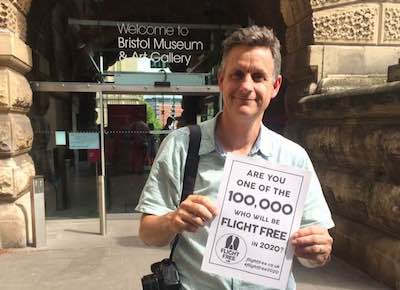In October this year we were asked to take part in a debate on Sky News about ‘flight shame' and if we really should be that worried about flying.
The debate was in response to this article written by the Sky News climate change correspondent.
The article argues that there are bigger, more effective things we can do in terms of reducing our carbon emissions than stopping flying – especially as flying gives us so much, so the emissions are worth it because the benefits are so great.
We were really looking forward to clarifying some of the issues in the article, but at the last minute we were bumped by Brexit. We were lined up for the following day but again, mic-ed up and ready to go, we were bumped – by Trump this time.
So we’re going to publish our half of the debate here.
The article argues that:
"Aviation accounts for just 2% of global emissions – much less than agriculture, forestry and other land use (around 25%) and electricity and heat production (also around 25%), and the global fashion industry (8%)."
…so it can’t be that bad.
This common statistic is often used to demonstrate that the impact of flying is lower than other parts of our lifestyles. But it's misleading. The stats are such because we all feed ourselves, heat our homes and clothe ourselves, but not everyone flies.
Indeed, earlier in the article it's acknowledged that only a small proportion of the world’s population actually flies – less than 10%, according to most sources. In the UK, less than half of us fly in any given year. But for those who do fly, the effect on your carbon footprint is massive.
"Only a small proportion of the world’s population actually flies. For those who do fly, the effect on your carbon footprint is massive."
So how does aviation really relate to our other lifestyle choices?
Let's start with food.
Eating a plant-based diet saves around 0.8 tonnes carbon a year, according to Lund University stats. We calculate it as around 1.5 tonnes, based on this article (meat-heavy diet = 15.8 lbs/7.11kg CO2-eq per day, which is 2.595 tonnes per year. Vegan diet = 6.4lb/2.88kg CO2-eq per day, so 1.051 tonnes per year, giving a 1.544 tonne saving)
How about transport and energy?
For transport and energy, going car free will save somewhere in the region of 2.6 tonnes CO2 per year (average mileage, average model), and buying green energy will save around 1.5 tonnes (Lund University again).
So how do these relate to flights?
If you fly to a holiday resort on the Caspian Sea, the 1.5 tonnes you saved by going vegan are gone. Dubai? 1.86 tonnes. New York? 1.89. Jamaica, 2.6, LA, 2.9, Bangkok, 3.2, Bali, 4.2, New Zealand, more than 6. Even if you’re travelling short haul, within Europe, where journeys typically lie at between 0.5 and 1 tonne, it quickly adds up. This tonnage is per passenger, for one return flight, so for those who fly a lot, those flights would smash through any carbon savings made elsewhere many times over.*
The second argument in the article is
"The 2% of global emissions happens in return for extraordinary benefits – not just individuals being able to go on holiday and to see friends and family [but] the rapid movement of people and goods in an interconnected world, and all of the cultural, social and economic benefits that come with that."
Here, the debate gets much more subjective.
It depends on your definition of ‘benefits’. While there is no doubt that international travel has given us a huge amount in terms of social and cultural progress, we cannot ignore the downsides. We have shrunk the world to such an extent that we forget what a privilege it is to be able to travel so far, so fast.
The number of ‘conscious’ travellers is very small compared to those who see the world as their playground. We sit on a beach with other Brits and drink cocktails. We might be charmed by the local culture, but do we genuinely interact with it? And what about over-tourism? Those cities that are overrun with hen and stag parties? Their residents would probably argue with our definition of ‘extraordinary benefits.’
And this is before we even think about the climate impact. Even in the face of climate emergency, we continue to burn fossil fuels at an alarming rate. There are more greenhouse gasses in the atmosphere than at any time in human history. The effect on the climate and biodiversity is disastrous, and we are hurtling towards the tipping point of irreversible climate change.
"There are more greenhouse gasses in the atmosphere than at any time in human history. We are hurtling towards the tipping point of irreversible climate change."
Articles about our effect on the environment become ever more common: only today the UN warned that we must make an unprecedented effort to cut levels of greenhouse gases. Weather extremes, wildfires, species extinction, crop failures, climate refugees and water shortages are increasingly becoming the norm. Climate disaster doesn't sound so beneficial.
Yet we ignore the reality because we want our holidays. But not flying doesn't mean not travelling. There are many other means by which to see the world. Overland methods can give a greater and more authentic travel experience than flying: going slow is good for the soul, and you learn far more about how landscapes and cultures connect when you travel overland.
So is ‘flight-shame’ really misplaced?
It’s a little surprising (and disheartening) to see a climate change correspondent so unaware that aviation forms the biggest part of our western footprints. Could the answer lie in the admission, ‘I fly a lot’? It’s easy to dismiss a social stigma if it doesn’t serve your purpose. We, quite naturally, feel protective over our comfortable lives, and resist any suggestions that they should change. We feel good because we do the easy stuff, but we need to do so much more. Yes, changing our diet, yes, driving less, yes, buying less, consuming less, wasting less, shopping local – these are all things that would make meaningful differences. But we cannot ignore the fact that flights are equal to, and bigger than, most of these things.
"We cannot ignore the fact that flights are equal to, and bigger than, most of these things."
The term ‘flight-shame’, or ‘flygskam’, emerged in Sweden as a result of many people becoming aware of the environmental impact of flying. If ‘flight-shame’ is what's needed to bring about behaviour change, so be it, but it's not something we actively promote. A side note: the term is now often cited incorrectly as ‘flight-shaming’ or ‘the flight-shaming movement’ (there is no such thing), and used to sell headlines (crude as that sounds).
But the very fact that it's getting the conversation out there can only be a good thing. We are now starting to talk about aviation in the way that we spoke about veganism five years ago – not nearly enough, but we’re starting to get it.
The truth is, the climate crisis is the most significant challenge humanity has ever faced. It’s not a side-issue, it’s THE issue. We cannot justify the mass burning of fossil fuels purely to satisfy our wanderlust, as if everything is OK.
"We cannot justify the mass burning of fossil fuels purely to satisfy our wanderlust, as if everything is OK."
But neither does this spell the end for travel. It’s simply time to rethink it. Travel isn't about how far you go, it's about how you go and what you do when you get there. And there are plenty of ways to live and travel, even thrive, without flying.
*emissions data from flightemissionmap.org




